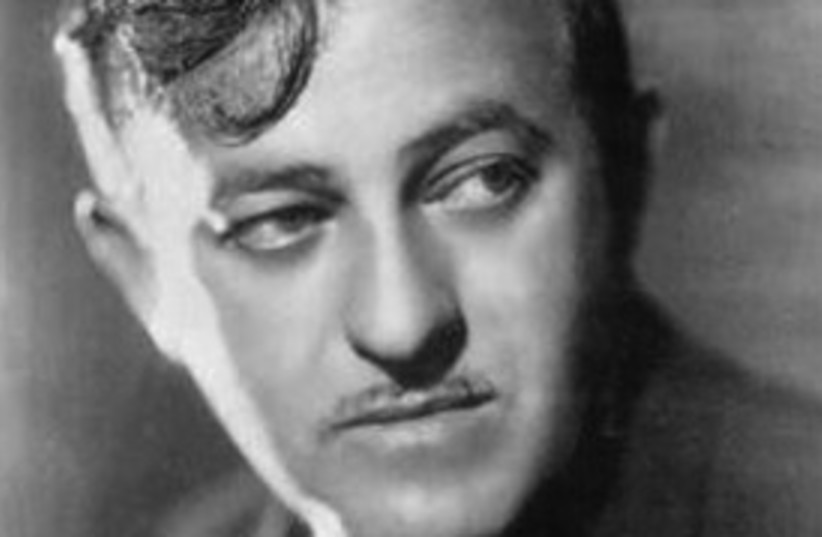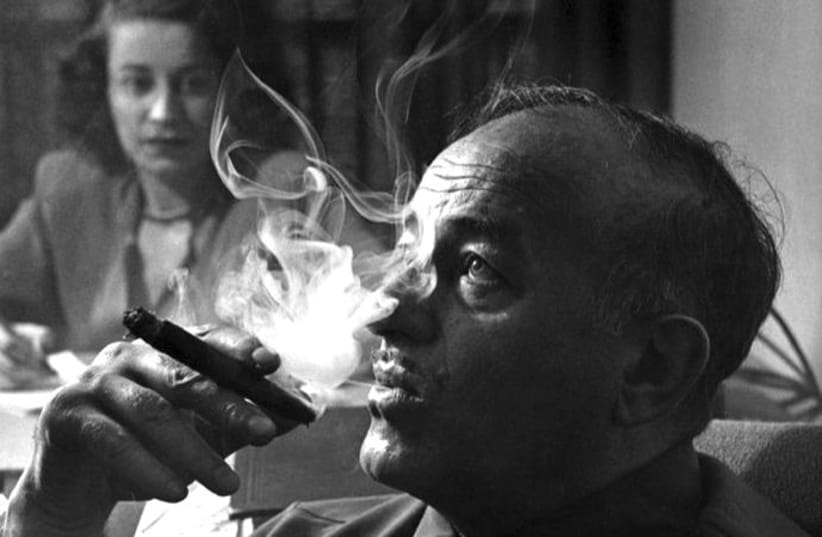
(I had been invited to speak at the luncheon in the library following the dedication of the street renaming on June 30, 2004 just outside the building entrance that drew several hundred people. The notables attended the luncheon, and they included political and cultural figures of the community, as well as my dear mother who had been acquainted with Ben Hecht back in the 1930s. The library had recently received Hecht’s notes and papers from the family. The following article is based on my speech.)
Ben Hecht had several careers of note: five as a champion: journalist, author, playwright, screenplay writer, political activist.
He was a notable city reporter in Chicago during the second decade of the 20th century, equivalent in fame then to columnist Mike Royko of more recent times. One might say that Hecht and Royko made Chicago “the” great American city of newspaper writing. Hecht’s book entitled 1001 Afternoons in Chicago, a collection of his daily front-page columns in the Chicago Daily News, first published in the 1920s, is considered among the best American journalism of the 20th Century.
Hecht became a man of letters, published more than 25 books, mostly novels, many short stories, several plays, movie scripts, and became a central figure in the literary world. He was not on the periphery looking in. He sat at the head, as at the famous Round Table of writers that met at New York’s Algonquin Hotel during the 1920s.
One of his plays, entitled Front Page, played a long run of performances on Broadway, and won the Pulitzer Prize. It was converted into no less than four(!) Hollywood motion pictures. Two are film classics: My Girl Friday starred Cary Grant and Rosalind Russsell, with Howard Hawks directing (1940), and Front Page starred Jack Lemon and Walter Matthau, and was directed by Bill Wilder (1974). The other two also had notable casts: the first rendition in 1931 had Adolphe Menjou and Pat O’Brien, then notable actors, in the leading roles, and a 1984 version starred Kathleen Turner and Burt Reynolds. Front Page remains a staple of American theater, entertaining to this day. I have seen it on Chicago stages three times in the twenty-first century.
Hecht also published his own newspaper – The Chicago Literary Times – and edited it for several years, losing a lot of money, of course.
He moved to Hollywood in the late 1920s, “for the easy money,” he wrote in his memoirs, after some years in New York after beginning his notable career in Chicago. He quickly won an Oscar for Best Original Screenplay for his film Underground (in 1929). He would be nominated more than a half-dozen times, for Best Original Screenplay and for Best Adaptation. He was Hollywood’s preeminent screenwriter for three decades. Seventy films (!) have his credit line, including such great productions as Some Like it Hot, Scarface, Viva Villa, Twentieth Century, Gunga Din, Monkey Business (with the Marx Brothers), Farewell to Arms (based on Hemingway’s novel), and Wuthering Heights. Film critic Pauline Kael of The New Yorker wrote that he had a hand in half the films produced in Hollywood during the 1930s and 1940s.
Hecht became known as Hollywood’s script fixer, working on the great classics of those years, including Gone with the Wind, Casablanca, Stagecoach, and Roman Holiday. He wrote wonderfully flowing and memorable dialogue.
As antisemitism grew in Europe and war clouds loomed, Hecht became a political activist, and earned a reputation as a Jewish hero of America. The activism went through several phases, as the goals changed with the world situation and the needs. First, in the early 1940s, he fought for the right of refugee Jews to form a Jewish Army to fight the Nazis alongside the British. He was a founder of an organization based in the USA that became known as The Committee, with Peter Bergson (alias for Hillel Kook, a Jew of Eretz Israel/Palestine and the Irgun underground movement fighting for Jewish independence, and nephew of Jerusalem’s chief rabbi, Rav Kook), Bill Rose (the famous band leader), Arthur Szyk (famed illustrator of the times), with assistance from actors Stella Adler (of the Actor’s Studio) and Marlon Brando, entertainer Will Rogers, two US Supreme Court justices (not Jewish), several US senators, and some (not enough) journalists.
When news of the Holocaust came through, by 1942, the focus of The Committee shifted to fight the passivity of the American establishment, Jewish and otherwise, and the inaction regarding it by the president of the US, Franklin Roosevelt. The Committee’s idea was that FDR could threaten the Nazis that war criminals would be punished after the war, and if the threat did not have a deterrent effect, then at least it would be an act of good faith effort by the Allies.
As the war ended, Hecht’s group raised funds to buy, outfit and crew ships to carry Jewish refugees from Europe to Palestine, the Jewish original homeland and scene of modern Zionist development. A crewman on one of the ships, a yacht that carried some 600 youthful Jewish survivors from Marseilles, the yacht renamed “SS Ben Hecht” was here with us for the ceremony – David L. Gutmann, professor emeritus in psychology at Northwestern University.
Then in 1946, Hecht began to raise money and emotion support for the Jewish underground, fighting Britain to open the gates of Palestine to Jewish refugees from Europe, and then to form a Jewish state. Throughout these years he wrote scripts for pageants that to audiences in the mid-late 1940s of tens of thousands.
The British so hated his rabble rousing (It was compared to that of Tom Paine during the American Revolution!), that they banned movies that had Ben Hecht’s name in the credits, from the British Empire!
Hecht was thus blacklisted, not like the others of his time, but in his case for being a Jewish patriot! Hecht took the British ban, which affected severely his ability to work for publication under his own name, as a badge of pride.
Hecht served as a role model of a civilian hero of conscience.


After the war, Hecht continued to write film scripts, often under alias and at far lower fees because of the British boycott, and he turned his hand to television. He became the host on the first popular weekly interview show, The Ben Hecht Show.
We had one person at the ceremony who met him: my mother, Sylvea Zimmerman. She had a good friend, Bertha Freshman, from her days at Marshall High School on Chicago’s West Side, who married the stage impresario and film producer Mike Todd. The couple lived in New York, and my mom visited and stayed with them a number of times in the late 1930s.
Mike Todd, later widowed and to marry film star Liz Taylor, knew Hecht well, and thus my mother and father would meet Hecht with the Todds for dinner occasional. My father also knew Hecht through his books; he had bought and read them all. When Hecht died in 1964, I recall that at a family dinner gathering soon after, my father called for a moment of silence to honor Hecht and toast him. I inherited a shelf of first editions now on a prominent bookshelf in my library.
Hecht published several non-fiction books, three with particular Jewish content, and these live on and are important for some of us to read. The first, published in 1944, is a history of and an out-of-the-ordinary look at antisemitism. He entitled the book Guide for the Bedeviled, and in-spite-of the topic it is optimistic and humorous.
His autobiography Child of the Century may be the most delightful I have ever read, and I read a lot. It deals with his formative youth, is filled with fascinating anecdotes about his years as a reporter and a “picture snatcher,” as an author and playwright, in the New York literary scene, and then as Hollywood’s leading writer. The concluding chapter about his Jewish activism, in the group called “The Committee,” is powerful, sad, and inspiring. As an indication of Hecht’s statue when the autobiography was published in 1954, it was reviewed on the front page of the Book Review section of The New York Times by the already famous novelist and a future Nobel Prize winner for literature, Chicago’s Saul Bellow.
In 1961, Hecht published his most controversial book, an expose of a 1950s trial in Israel, known as the Kastner Affair in a book called Perfidy. It served as an indictment of the non-action by the then Zionist leadership of Israel in its pre-state dealings re the Jews of Europe. The Jewish establishment in the USA and elsewhere spiked the book. I first read it when living in Israel during the 1970s via a Xerox photocopy that was being handed from one reader to another. If you wonder about the controversy the book Perfidy created, read it for yourself. It was republished several years ago and is still available. Hecht was so self-confident that he was anything but politically correct.
These three books should be read by all interested in Jewry during the past century.
In conclusion, it is so suitable that a street be named for Ben Hecht in Chicago, where he became an eminent journalist; in front of the Newberry Library, where Hecht’s papers now reside; and alongside a lovely quiet park long known as Bughouse Square, where men could speak their minds in public.
Raise your glasses! Hats off to a great American, an eminent Chicagoan, a heroic Jew, and a role model to freethinking men everywhere. To Mr. Ben Hecht. Salut! Cheers! L’Chaim!
